A British medic in Gaza spoke of the dire reality facing patients at UK-backed field hospitals as a major report found a quarter of Palestinians in the enclave are experiencing famine, with the number set to rise.
Mandy Blackman, the nurse-in-charge at UK-Med’s Al Mawasi field hospital in southern Gaza, told the Daily Mail on Friday that hospitals are experiencing shortages of ‘so many’ drugs, with ‘much of our equipment’ stuck on the border ‘waiting to come in’ as food shortages pose an existential threat to the local population.
Patients can be given one meal a day at Gazan hospitals under strain, but will inevitably be discharged into uncertain environments, which complicate healing and exacerbate existing conditions, she explained.
Ms Blackman, who usually works at Kettering General Hospital in Northamptonshire, said: ‘I have been a nurse for 25 years and I have seen more mass casualty here than I have seen in a lifetime in the UK.’
UK-Med, a British charity supported in part by the Foreign Office, has sent medical workers, including NHS-trained staff, to Gaza to help perform thousands of life-saving treatments since the conflict broke out.
Sixty-one per cent of UK-Med’s interventions are emergency department interventions, the Foreign Office told the Daily Mail. The humanitarian crisis surrounding the war has been complicated by access to food and clean water.
More than 62,000 people have been killed in Gaza since Israel began its military campaign, according to Gaza’s Hamas-run health ministry. Israel began its campaign in response to the Hamas-led attack on southern Israel in October 2023, in which 1,200 people were killed and 251 taken hostage.
Ms Blackman spoke to the Daily Mail as the Integrated Food Security Phase Classification (IPC) system said on Friday that 514,000 people are now experiencing famine in Gaza, with the number due to rise to 641,000 by the end of September.
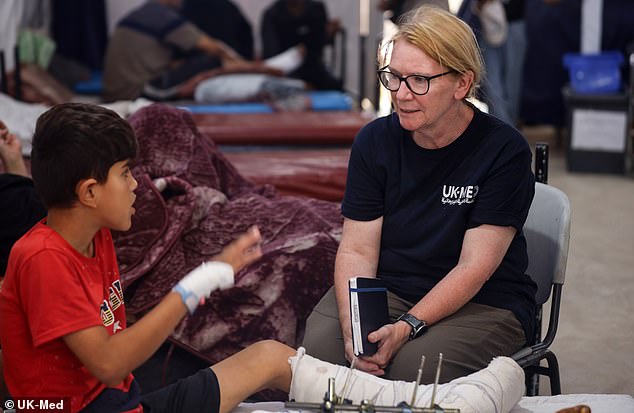
Mandy Blackman is the nurse-in-charge at Al Mawasi field hospital. Ordinarily, she works at Kettering General Hospital in Northamptonshire
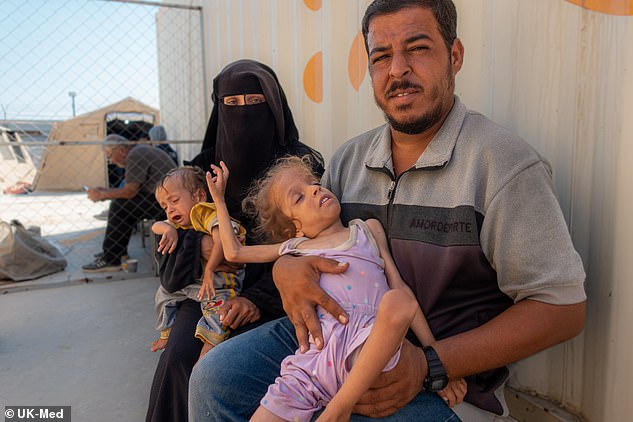
Nurses on the frontlines are seeing patients present with signs of malnutrition as the war continues
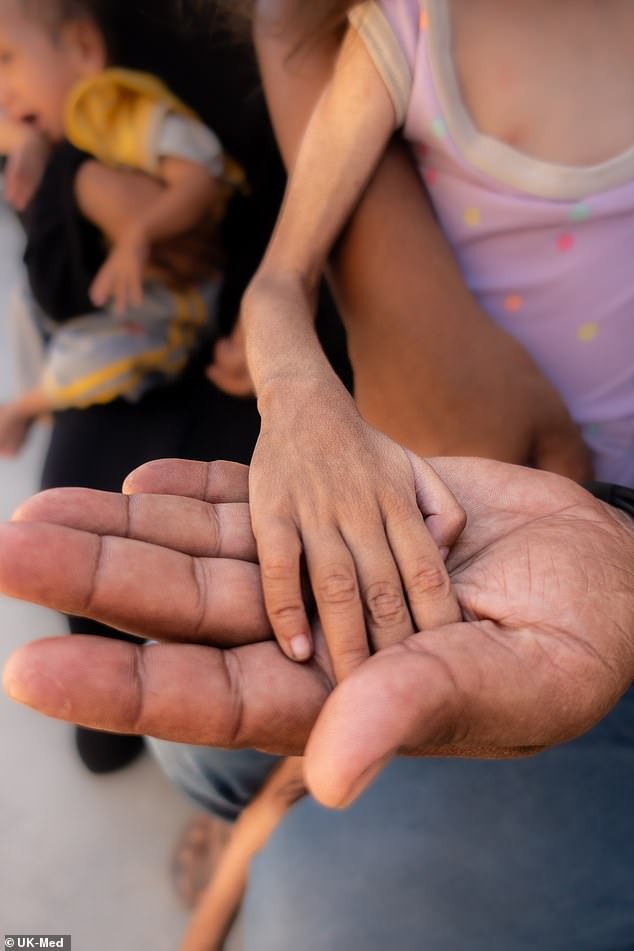
‘Definitely I can see that people are thinner,’ Ms Blackman told the Daily Mail on Friday
The report said it expected to see even more people get sick over the next month, forecasting a rise in diseases ‘including acute respiratory illnesses – driven by seasonality, malnutrition, and crowded living conditions – as well as acute watery diarrhoea, bloody diarrhoea, measles, and polio’.
Asked whether she was already witnessing a greater prevalence of these kinds of conditions, Ms Blackman said: ‘Yes. Definitely.’
‘Definitely I can see that people are thinner. Staff, patients. Patients come in, they may require emergency surgery on their abdomen due to the injuries they have received. They are malnourished, so that impacts upon their healing as well.
‘Many of our patients are malnourished. We use the Mid-upper arm circumference (MUAC) score [as used by the IPC] … It’s a very quick way of us establishing whether they have severe malnutrition or moderate malnutrition.
‘Many of our adult patients – and many of our patients are predominantly male – are malnourished. Obviously, when we look at them. And we can certify that when we check their MUAC score as well.
‘So that includes their healing, yes, certainly lots of respiratory problems that would in normal circumstances, you would have access to healthcare. We would get some medication or the diet would be set. So you’ll be able to rest and you’ll be able to sleep and get all the rest that you needed in order to overcome these illnesses. It’s not there.
Patients leave hospital often to go back to tents with little protection from the elements, with some 90 per cent of Gaza destroyed by the conflict.
‘You see images of Gaza [before the war] and it was beautiful and colourful and people had a good life. But now it’s a uniform grey. I’d say grey, where it’s just dust, concrete.
From cleaning staff to the directors of hospitals, she said, ‘everyone has had everything stripped away. They’re all living in tents.’
UK-Med is able to help feed on duty national staff working at its sites. The team has access to clean water thanks to the work of their logistics team, as well as a supply of brackish ‘semi-treated’ water and emergency ration packs.
But food insecurity is a threat looming over the entire Gaza Strip and food on site is limited, and water has to be used with caution.
Local team members, who Ms Blackman commended for their ‘strength and courage’, often commute for ‘two to three’ hours into work and have limited access to food and potable water once they leave.
Access to medication is also dwindling in the beleaguered Gaza Strip, she explained.
‘Many of the items I ordered last year … are still waiting to come in. And so that does limit some operations that we can do,’ she said. In other cases, warehouses in Gaza containing medication or equipment have been destroyed in the conflict.
Medics, as such, are planning ‘accordingly’ and coming up with ‘alternatives’ to get around shortages.
Amid a shortage of analgesic medicines, she said, ‘maybe we’ll do a nerve block or sedation or something. It forces you to look at your practise, what you’re used to doing, and you might have to think again what you’re going to do’.
Staff, too, are mindful of how much clean water and food they use. Teams remain determined and different organisations ‘work together to support each other’, sharing missing equipment between each other at times to meet demand.
But with UK-Med treating as many as 15,000 patients a week across three sites, teams face enormous challenges to be able to continue their vital work.
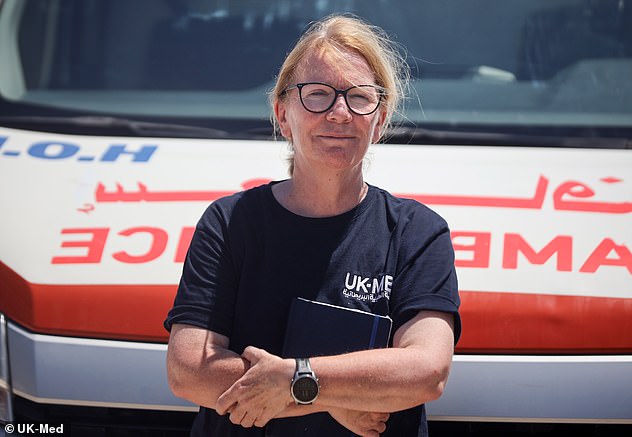
‘I have been a nurse for 25 years and I have seen more mass casualty here than I have seen in a lifetime in the UK,’ Ms Blackman told the Daily Mail
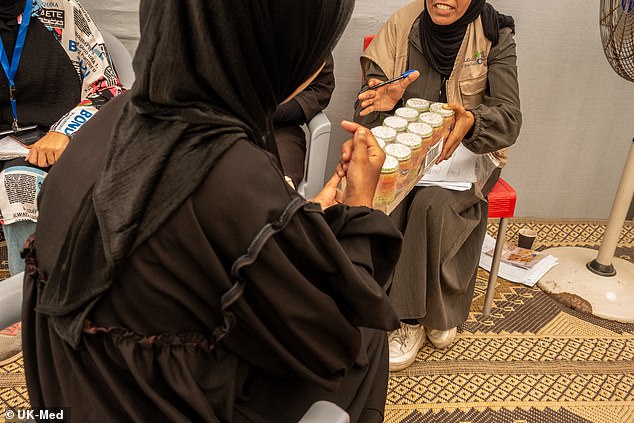
Hospitals are experiencing shortages of essentials and say patients will struggle to heal
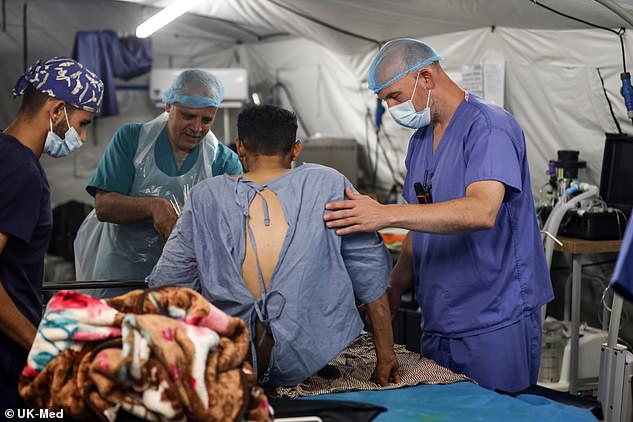
UK-Med is supported by the British government to deliver aid to places that need it
Now on her fourth visit to Gaza, Ms Blackman heralded the cooperation and resolve of colleagues continuing in their work despite the challenges. She also acknowledged the ever-growing strain on medical staff and the wider population.
‘I would emphasize the emotional exhaustion of the staff and the patients that come in. They are now physically tired. There was always a bit of hope on the last couple of rotations. Especially at the beginning there was hope.
‘But now their reserves are low. Their shoulders are down. Just that hope that’s fading away and they’re emotionally exhausted.’
Ms Blackman said a woman she spoke to on Thursday, who was unable to breastfeed her child, was relying on formula now priced at $50 USD.
‘Who can afford that? Also they are mixing these formulas with maybe not clean water, with brackish water. It’s very difficult. It’s in many ways indescribable.’
Hope is in short supply in Gaza after some 22 months of war. Recent airdrops from other nations may represent a drop in the ocean in terms of the aid needed to feed the population, but do ‘give hope to people’, she said.
Patients can go to UK-Med supported centres for routine services, but also arrive with traumatic injuries linked to the war. Gunshot wounds are ‘typical’, Ms Blackman said, ‘and there are some explosive injuries and crush injuries we’re seeing a lot more of as well.’
Dozens of people are reported to have been injured or killed by falling aid packages, and hundreds killed while trying to source food, according to the UN.
People are arriving at centres ‘either from the package itself, or trucks, or crushed by other people’, she explained.
Working in Gaza, with tragedy so immediate, can take its toll on staff. Asked how she remains composed, Ms Blackman championed the strength of her team.
‘Knowing that you’re here helping everybody as best you can, that provides some comfort as well.
‘And just seeing the strength and courage from the national staff that we work with.’
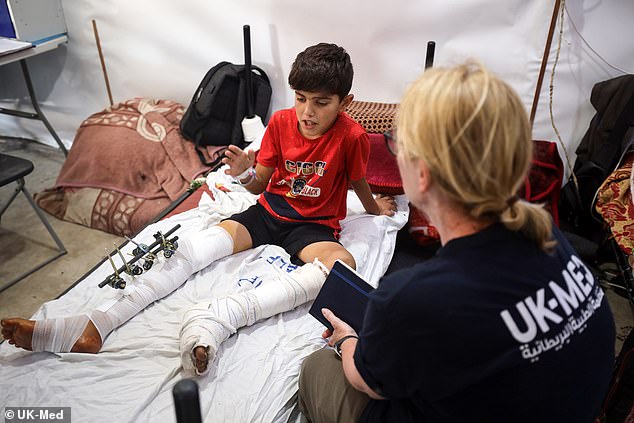
Al Mawasi alone sees around 1,000 people a day, according to UK-Med. The field hospital was initially built entirely from materials salvaged from the local area
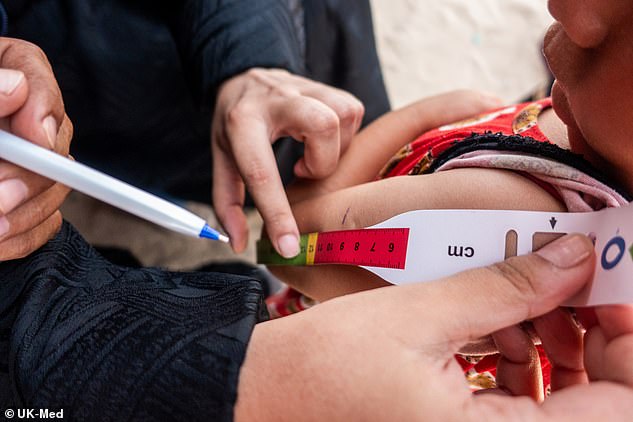
Medical professionals in Gaza can check for malnutrition with a ‘MUAC score’ – a measure of arm circumference
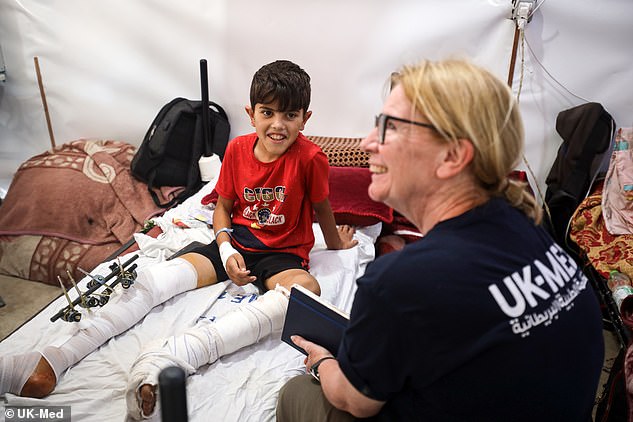
Medical staff are emotionally exhausted after 22 months of war. But the resolve of others helps them to keep doing their jobs
UK-Med, which draws on a pool of 1,000 global healthcare professionals, operates in conflict zones around the world, including Gaza and Ukraine.
In Gaza, this ‘includes the full range of treatment, from primary healthcare to life and limb saving surgeries’, the FCDO told the Daily Mail.
The UK government last month pledged a £60 million humanitarian aid package to support the delivery of healthcare, food and water in Gaza. This included ‘vital funding’ to treat patients at UK-Med field hospitals in Gaza.
Aid workers have treated more than 600,000 patients at hospitals in Gaza with UK government support, the Foreign Office said earlier this week as it commended British charities working to abate the humanitarian crisis on the ground.
Baroness Chapman, the Minister for Development, commended the brave work of humanitarian workers and paid tribute to those who have lost their lives while delivering aid as the UN revealed a record 383 aid workers were killed in 2024.
The UN said on Tuesday, World Humanitarian Day, that the 2024 figure was a ‘shameful indictment’ of international apathy, and warned this year’s toll was equally disturbing.
The 2024 figure was up 31 per cent on the year before, the UN said, assessing the climb was ‘driven by the relentless conflicts in Gaza, where 181 humanitarian workers were killed, and in Sudan, where 60 lost their lives’.
The government is planning to acknowledge UK-Med staff among the recipients of the new Humanitarian Medal, which recognises ‘the courage and dedication of humanitarian workers who risk their lives to help others as part of the UK’s humanitarian responses in the world’s most dangerous places’, the FCDO said.












